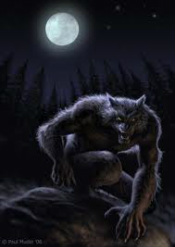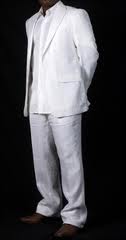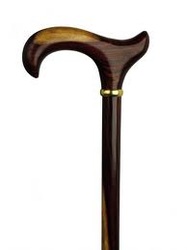Le Loupgarou - Literature Notes
Please note that the information given on this poem is not meant to replace any material given in the classroom setting. It is a very BASIC giude to enable a literal understanding of the poem. Metaphorical interpretations should be sought in the classroom.
|
The physical structure of this poem has been altered from the original layout in the text. A 5.curious 1.tale that threaded through town Through greying women sewing under eaves, Was how his greed had brought old Le Brun down, 1.greeted by slowly shutting jalouses When he approached them in 6.white linen-linen suit, Pink glasses, cork hat and 2.tap-tapping cane, 3.A dying man licensed to sell sick fruit, Ruined by fiends with whom he'd made a bargain. It seems one night, these 4.Christian witches said, He changed himself into an 7.Alsatian hound, A slathering lycenthrope, hot on a scent, 1.But his own watchman dealt the thing a wound Which howled and lugged its entrails, trailing wet With blood back to its doorstep, almost dead. Walcott, D. 'Le Loupgarou' in A World of Prose. Edited by Mark McWatt and Hazel Simmonds McDonald. Pearson Education Ltd, 2005. |
This is the OPINION of one individual, which might not coincide with the views of others. LITERAL MEANING This poem tells the tale of old LeBrun, a man that was rumoured by the townspeople to be a loupgarou. Old women would relax under eaves and gossip about Le Brun, while literally shutting him out of their lives with their closing windows. The prevailing gossip, in this poem, is that he transformed into a hound one night, but was dealt a wound by his own watchman. He then lugged his entrails back to his doorstep, almost dead. |
LITERARY DEVICES
1. ALLITERATION
- Lines 1-3: This alliteration gives the reader a visual imagery of the manner in which the gossip about Le Brun spread. A thread is thin and fine and can weave itself in any crevice, sometimes in a very non-linear and sinuous manner. This describes the way in which the gossip spread. It managed to touch the whole village in an almost insiduous, and complete, manner.
- Line 5: This literary device speaks to the results of the gossip. Le Brun is alienated from the people of the town. Their fascination with him, however, is evident by the fact that they slowly shut their jalouses/windows. The lack of speed implies that they are watching him, while also alienating him.
- Lines 17-21: This alliteration highlights the severity of the loupgarou's injuries. You can almost see and hear the wetness of the blood, as well as see the entrails trailing wet through the use of this device.
2. ONOMATOPOEIA
The tap-tapping cane is a part of Le Brun's physical description. He appears to stand out, in terms of his physical appearance, down to the use of his cane.
3. PARADOX
This statement appears nonsensical at first, but actually makes sense in the long run. The loupgarou is, in fact, a man who is leading a half life as man and beast, so he is not really 'living'. The fact that he can pass on the 'gift' of becoming a werewolf clarifies the fact that Le Brun is actually 'licensed to sell sick fruit', or pass on his sick 'gift'.
4. OXYMORON
The words 'Christian' and 'witches', placed together, emphasizes the dual nature of the women in the village. They are good Christian women who mean no harm, but their fear of the 'difference' that they sense in Le Brun (contributed by his mode of dress), leads them to react in an unchristian manner, like witches, in dealing with him.
* IRONY
It is ironic that Le Brun's own watchman dealt him a lethal blow.
IMPORTANT WORDS/ PHRASES
5.curious
This word emphasizes the strangeness of the story that is circulated about Le Brun.
6.white linen-linen suit, pink glasses, cork hat (and cane)
This outfit would let anyone be seen in a crowd, or other wise. It emphasizes Le Brun's difference , hence, one of the reasons that he would be the focus of gossip. Imagine an individual dressed in the combination below:
7.Alsatian hound, a slathering lycenthrope
This description of Le Brun displays the distaste that is felt towards him in his animal form.
MOOD/ ATMOSPHERE
The mood of the poem is one of annoyance.
TONE
The tone of the poem is sarcastic reflective. The persona appears to be simply recounting a piece of gossip.
THEMATIC CATEGORIZATION
Supernatural
Contributor: Leisa Samuels-Thomas
This description of Le Brun displays the distaste that is felt towards him in his animal form.
MOOD/ ATMOSPHERE
The mood of the poem is one of annoyance.
TONE
The tone of the poem is sarcastic reflective. The persona appears to be simply recounting a piece of gossip.
THEMATIC CATEGORIZATION
Supernatural
Contributor: Leisa Samuels-Thomas







